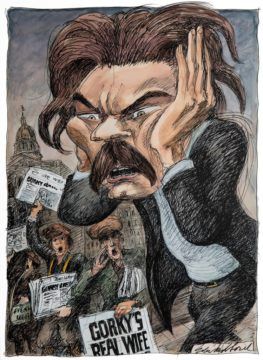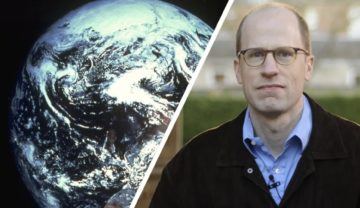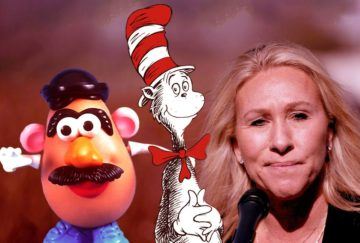George Packer in The Atlantic:
 In 1966, a young American journalist named Frances FitzGerald began publishing articles from South Vietnam in leading magazines, including this one. She was the unlikeliest of war correspondents—born into immense privilege, a daughter of the high-WASP ascendancy. Her father, Desmond FitzGerald, was a top CIA official; her mother, Marietta Tree, a socialite and liberal activist. FitzGerald was raised with servants and horses, and she had to fend off advances from the likes of Adlai Stevenson (her mother’s lover) and Henry Kissinger. Her family contacts got her through the door of feature journalism in New York, but as a woman, she was denied the chance to pursue the serious work she wanted to do. She escaped this jeweled trap by making her own way to Saigon at age 25, just as the American war was escalating.
In 1966, a young American journalist named Frances FitzGerald began publishing articles from South Vietnam in leading magazines, including this one. She was the unlikeliest of war correspondents—born into immense privilege, a daughter of the high-WASP ascendancy. Her father, Desmond FitzGerald, was a top CIA official; her mother, Marietta Tree, a socialite and liberal activist. FitzGerald was raised with servants and horses, and she had to fend off advances from the likes of Adlai Stevenson (her mother’s lover) and Henry Kissinger. Her family contacts got her through the door of feature journalism in New York, but as a woman, she was denied the chance to pursue the serious work she wanted to do. She escaped this jeweled trap by making her own way to Saigon at age 25, just as the American war was escalating.
The Vietnam War had already produced some of the greatest journalism of the century and made the reputations of young reporters such as David Halberstam, Neil Sheehan (who died earlier this year), and Malcolm Browne. All of them were men. All focused their reporting on the fighting, and on the lies and failures of American officialdom. FitzGerald pursued a different story. Sheltered all her life, she was profoundly shocked by the suffering of the Vietnamese—not just the death, injury, and displacement, but the loss of identity under the crushing weight of the Americans. Rather than competing with her male colleagues, she spent time in hospitals, villages, and slums, and she became engrossed in the politics of Buddhist students, the tragedies of refugees, the strategy of the Viet Cong, the history and culture of Vietnam. It took a 20-something Radcliffe graduate with an appetite for French anthropology and immersive reporting to bring home the bad news that no officials and few journalists were telling Americans: The war was hopeless because the United States, ignorant of Vietnam, had taken over the colonialist role of the French.

 Everyone seems to be talking about the problems with physics: Peter Woit’s book Not Even Wrong, Lee Smolin’s The Trouble With Physics, and Sabine Hossenfelder’s Lost in Math leap to mind, and they have started a wider conversation. But is all of physics really in trouble, or just some of it? If you actually read these books, you’ll see they’re about so-called “fundamental” physics. Some other parts of physics are doing just fine, and I want to tell you about one. It’s called “condensed matter physics,” and it’s the study of solids and liquids. We are living in the golden age of condensed matter physics.
Everyone seems to be talking about the problems with physics: Peter Woit’s book Not Even Wrong, Lee Smolin’s The Trouble With Physics, and Sabine Hossenfelder’s Lost in Math leap to mind, and they have started a wider conversation. But is all of physics really in trouble, or just some of it? If you actually read these books, you’ll see they’re about so-called “fundamental” physics. Some other parts of physics are doing just fine, and I want to tell you about one. It’s called “condensed matter physics,” and it’s the study of solids and liquids. We are living in the golden age of condensed matter physics. A mutating virus is destroying a world-view that has ruled governments, business and popular culture for a century or more. A model in which humankind was achieving ever higher levels of control over the planet has shaped much of modern thinking. Evolution has been understood as the ascent from primeval slime to unchallengeable human dominance over all other forms of life. Fundamentally at odds with the theory of natural selection, this was never more than pseudo-science. Yet from the late 19th century onwards it became a ruling paradigm, captivating generations of thinkers and inspiring world-changing political movements. Today the myth is crumbling. For the first time in history, using genomic sequencing, natural selection is being observed, in detail and real time, at the level of genes. Evolution is continuing, rapidly, with the virus as the chief protagonist.
A mutating virus is destroying a world-view that has ruled governments, business and popular culture for a century or more. A model in which humankind was achieving ever higher levels of control over the planet has shaped much of modern thinking. Evolution has been understood as the ascent from primeval slime to unchallengeable human dominance over all other forms of life. Fundamentally at odds with the theory of natural selection, this was never more than pseudo-science. Yet from the late 19th century onwards it became a ruling paradigm, captivating generations of thinkers and inspiring world-changing political movements. Today the myth is crumbling. For the first time in history, using genomic sequencing, natural selection is being observed, in detail and real time, at the level of genes. Evolution is continuing, rapidly, with the virus as the chief protagonist.
 Branko Milanovic in Foreign Affairs:
Branko Milanovic in Foreign Affairs: Jane Hu in Bookforum:
Jane Hu in Bookforum: Joanna Wuest in Psyche:
Joanna Wuest in Psyche: AMONG THE MANY ENTRIES in Edwin Frank’s increasingly encyclopedic New York Review Books Classics series is a genre of postwar European memoir: informed by psychoanalysis, ironic in tone or form, and of subject matter that’s both bourgeois and aristocratic—or at the intersections where upwardly moving middle classes and downwardly mobile inherited scions most resemble each other. Gregor von Rezzori’s Memoirs of an Anti-Semite, J. R. Ackerley’s My Father and Myself, Jessica Mitford’s Hons and Rebels: these books record their authors’ efforts to collect the pieces and resolve mysteries of their childhoods and adolescence—a task often complicated by the shattering impact of the Second World War—and have also become documents in their own right, testaments not only to a bygone world but to a bygone way of reckoning with privilege, secrets, desire, belonging, and money. Richard Wollheim’s Germs, first published posthumously in 2004, hits all these notes: his parents’ somewhat open marriage, his lower-class granny, his immersion in a milieu of genuine artists, appreciators, and pompous hucksters and hustlers, sometimes united in the same person. Wollheim was still fine-tuning the manuscript when he died in 2003, at eighty, and what we have is mostly organized around the childhood and adolescent years before he arrived at Oxford, though with occasional associative leaps forward and backward in time.
AMONG THE MANY ENTRIES in Edwin Frank’s increasingly encyclopedic New York Review Books Classics series is a genre of postwar European memoir: informed by psychoanalysis, ironic in tone or form, and of subject matter that’s both bourgeois and aristocratic—or at the intersections where upwardly moving middle classes and downwardly mobile inherited scions most resemble each other. Gregor von Rezzori’s Memoirs of an Anti-Semite, J. R. Ackerley’s My Father and Myself, Jessica Mitford’s Hons and Rebels: these books record their authors’ efforts to collect the pieces and resolve mysteries of their childhoods and adolescence—a task often complicated by the shattering impact of the Second World War—and have also become documents in their own right, testaments not only to a bygone world but to a bygone way of reckoning with privilege, secrets, desire, belonging, and money. Richard Wollheim’s Germs, first published posthumously in 2004, hits all these notes: his parents’ somewhat open marriage, his lower-class granny, his immersion in a milieu of genuine artists, appreciators, and pompous hucksters and hustlers, sometimes united in the same person. Wollheim was still fine-tuning the manuscript when he died in 2003, at eighty, and what we have is mostly organized around the childhood and adolescent years before he arrived at Oxford, though with occasional associative leaps forward and backward in time. In April 1906, Czar Nicholas caved in to protests from around the world, and released Maxim Gorky from the prison into which he had thrown him. Mark Twain and other writers, hearing that the celebrated author of “The Lower Depths” had been freed, invited him to New York City, and Gorky, still harassed by the secret police, accepted. With him on the voyage was the actress Maria Andreyeva.
In April 1906, Czar Nicholas caved in to protests from around the world, and released Maxim Gorky from the prison into which he had thrown him. Mark Twain and other writers, hearing that the celebrated author of “The Lower Depths” had been freed, invited him to New York City, and Gorky, still harassed by the secret police, accepted. With him on the voyage was the actress Maria Andreyeva. Elizabeth Kolbert’s favourite movie is the end-of-the-world comedy
Elizabeth Kolbert’s favourite movie is the end-of-the-world comedy  I’d read “Lolita” in college, and I was too lazy to bother to read it again when preparing for my part in “The Bookshop.” I was already a huge fan of Nabokov’s — I had bought copies of his memoir, “Speak, Memory,” in bulk to hand out to my friends at college, and I had worn thin his “Lectures on Russian Literature,” which are as withering as they are brilliant. (I’ll never forget my shocked delight at his excoriation of Dostoyevsky as “a mediocre writer with wastelands of literary platitudes.”)
I’d read “Lolita” in college, and I was too lazy to bother to read it again when preparing for my part in “The Bookshop.” I was already a huge fan of Nabokov’s — I had bought copies of his memoir, “Speak, Memory,” in bulk to hand out to my friends at college, and I had worn thin his “Lectures on Russian Literature,” which are as withering as they are brilliant. (I’ll never forget my shocked delight at his excoriation of Dostoyevsky as “a mediocre writer with wastelands of literary platitudes.”) Does history have a goal? Is it possible that all the human societies that existed are ultimately a prelude to establishing a system where one entity will govern everything the world over? The Oxford University philosopher
Does history have a goal? Is it possible that all the human societies that existed are ultimately a prelude to establishing a system where one entity will govern everything the world over? The Oxford University philosopher  Why did prescription opioids bring so much misery to the small towns of postindustrial America?
Why did prescription opioids bring so much misery to the small towns of postindustrial America? Despite his stature as a giant of Soviet Ukrainian literature, Bazhan remains all but unknown outside Ukraine. His work is formally sophisticated, his language rich, his subject matter multilayered. Translating him is, thus, no mean feat. But on top of that, for much of the 20th century, Bazhan’s pre-Party existence, and thus much of his best work, was unknown or inaccessible to potential translators. It is fitting, then, that the editors of this new volume of Bazhan’s work, Oksana Rosenblum, Lev Fridman, and Anzhelika Khyzhnia, have turned to the poet’s earlier poetry. The volume takes us through selections from Bazhan’s first three books, published in the giddy experimental atmosphere of the 1920s, before tackling some longer and more formally, thematically, and politically complex works from the early 1930s. Indeed, one of the most fascinating aspects of this book is the way it reveals the tension between Bazhan’s mercurial, untrammeled poetic genius and the creeping ideological strictures of Stalinism.
Despite his stature as a giant of Soviet Ukrainian literature, Bazhan remains all but unknown outside Ukraine. His work is formally sophisticated, his language rich, his subject matter multilayered. Translating him is, thus, no mean feat. But on top of that, for much of the 20th century, Bazhan’s pre-Party existence, and thus much of his best work, was unknown or inaccessible to potential translators. It is fitting, then, that the editors of this new volume of Bazhan’s work, Oksana Rosenblum, Lev Fridman, and Anzhelika Khyzhnia, have turned to the poet’s earlier poetry. The volume takes us through selections from Bazhan’s first three books, published in the giddy experimental atmosphere of the 1920s, before tackling some longer and more formally, thematically, and politically complex works from the early 1930s. Indeed, one of the most fascinating aspects of this book is the way it reveals the tension between Bazhan’s mercurial, untrammeled poetic genius and the creeping ideological strictures of Stalinism. It’s a little-known fact that Camus worked briefly as a meteorologist. For almost a year, from 1937-38, he wore a lab coat at the Algiers Geophysics Institute and catalogued measurements of atmospheric pressure from hundreds of weather stations across North Africa. The data had been piling up, and despite the arrogance of their imperial ambitions, the men who ran the Institute couldn’t attract enough funding. They didn’t have the money to hire a scientist trained for this “exacting and, in effect, stupefying task.”
It’s a little-known fact that Camus worked briefly as a meteorologist. For almost a year, from 1937-38, he wore a lab coat at the Algiers Geophysics Institute and catalogued measurements of atmospheric pressure from hundreds of weather stations across North Africa. The data had been piling up, and despite the arrogance of their imperial ambitions, the men who ran the Institute couldn’t attract enough funding. They didn’t have the money to hire a scientist trained for this “exacting and, in effect, stupefying task.” It’s early, but Republicans have already seized on their strategy for winning the 2022 and 2024 elections. Of course, it does not depend on mundane tactics like “running on their record” or “making robust arguments about how their policies are better than their opponents.” The GOP is instead returning to the well that has, time and again, paid off handsomely: feigning umbrage over culture war flashpoints, usually ones wholly invented by the right or propped up with lies, to distract from substantive policy debates that actually impact American lives.
It’s early, but Republicans have already seized on their strategy for winning the 2022 and 2024 elections. Of course, it does not depend on mundane tactics like “running on their record” or “making robust arguments about how their policies are better than their opponents.” The GOP is instead returning to the well that has, time and again, paid off handsomely: feigning umbrage over culture war flashpoints, usually ones wholly invented by the right or propped up with lies, to distract from substantive policy debates that actually impact American lives.